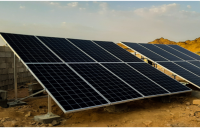Blog Post - December 2019
The Energy Access Dividend: Accelerating off-grid solutions and bolstering reliability can generate big gains in Honduras and Haiti
In the first partnership undertaken between Duke University (Energy Access Project), SEforALL and IDB, a team developed an “Energy Access Dividend” methodology specifically for Haiti and Honduras that can help drive more informed electricity planning. The approach can be used to understand the aggregate level of benefits that electrification can unlock, how to achieve these benefits and for whom. The research team attempted to quantify and monetize the benefits generated through accelerated electricity access. Criteria utilized included savings that electricity access generates on lighting and cell phone charging expenditures, the impact it has on emissions, and changes it produces in study time among schoolchildren. Where the data allowed, the team considered the type of energy access needed to support each of these categories of benefits. To do this, the report utilized the Multi-Tier Framework (MTF)[1] which categorizes households into energy access tiers depending on the quality, capacity, daytime and evening duration, reliability, legality, and safety of their electricity access. Our research looked at the linkages between income and electricity reliability and how additional benefits are likely to accrue as reliability increases. We found that the economic benefits of improving power quality to households that have it can be greater than providing basic access to first-time users. The “Dividend” model not only illustrates the aggregate level of benefits that electrification can unlock, but it can demonstrate the modalities (grid, mini-grid, solar home system) and populations (urban vs rural, low-tier vs high tier) that benefit. This can be crucial for improving the targeting and effectiveness of electricity planning.
Related Projects:
